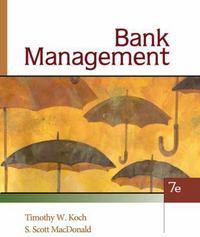Question
1.In the coming year, as the COVID-19 pandemic eases and the Federal government increases its expenditure, the economic recovery in the US is likely to
1.In the coming year, as the COVID-19 pandemic eases and the Federal government increases its expenditure, the economic recovery in the US is likely to speed up and inflation may start to take off. Assume that this prospect gives rise to expectations in currency markets that a year from now (early 2022) the Fed will raise the US interest rate and keep it at an elevated level for some years. The following set of questions is about impact of this prospect on the exchange rate and interest rate policies of emerging markets. In answering these questions, assume that the interest parity condition always holds and that the interest rates observed in emerging markets include risk premia. That is,treating the emerging economy as home country and the US as the foreign country, if the nominal domestic and foreign interest rates inclusive of risk premia areirandir*, risk free interest rates can be expressed as:
i=ir-andi*=ir*-*,
whereand*are the risk premia on domestic and foreign bonds, respectively. Since the risk premium for the US assets is practically negligible, assume that*= 0 and, therefore,i*=ir*. Then, the IP conditioncan be written as (1 +ir-)ee= (1+i*)e. Assume that this condition always holds. [30 points total for Question 8]
(a)Consider an emerging market economy, E, where policymakers need to assess the consequences of a rise in US interest rates next year.For now, suppose that the risk premium and interest rate policies in country E are given (i.e., can be treated as constant as the US interest rate changes). How would the expected rise in the US interest rate affectee(which is the expected exchange rate of country E's currency vis--vis the US dollarnext year, 2022)? Why? How would this prospect affect the spot exchange rate of country E's currency,e,now? Why?Please remember to explain your answers using concepts covered in this module of the course.[10 points]
Answer:
(b)Let's now consider a situation where because of the COVID-19 pandemic the businesses in country E have borrowed heavily in both dollars and domestic currency, while their revenues are stagnant and entirely in local currency. In this situation, a depreciation of the domestic currency or an increase in the domestic interest rate next year could make it difficult for the indebted businesses to pay back their loans and many of them may go bankrupt. Suppose the prospect of such a debt crisis raises the risk premium in E this year. Assume as in part (a), that the central bank plans to keep the domestic interest rate constant this year and beyond. How would this prospect affect the spot exchange rate of country E's currency? Why?Please remember to explain your answers using concepts covered in this module of the course.[7 points]
Answer:
(c)Now consider the situation in part (b), but assume the central bank of country E wants to prevent any change in the spot exchange rate of its currency vis--vis the US dollar this year. It plans to return to its past policies next year and let the currency move in whichever way determine by the market at that time. In this situation, what action should Country E's central bank take in regard to the interest rate,ir, this year?Please remember to explain your answers using concepts covered in this module of the course.[8 points]
Answer:
(d)Given the situation described in part (c), could the prospect of interest rate increase in the US and the response of emerging economy's central bank cause a debt crisis in country E this year?Please remember to explain your answers using concepts covered in this module of the course.[5 points]
Answer:
Step by Step Solution
There are 3 Steps involved in it
Step: 1

Get Instant Access to Expert-Tailored Solutions
See step-by-step solutions with expert insights and AI powered tools for academic success
Step: 2

Step: 3

Ace Your Homework with AI
Get the answers you need in no time with our AI-driven, step-by-step assistance
Get Started


